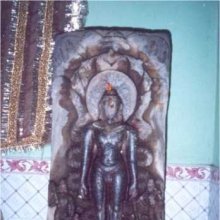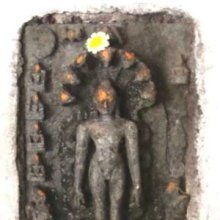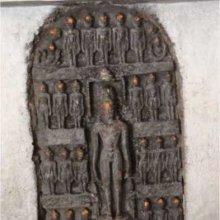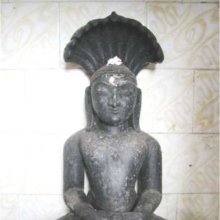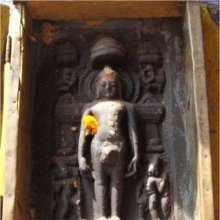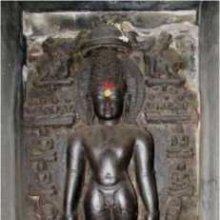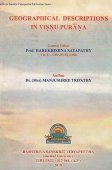Jagannatha, Jagannātha, Jagat-natha: 19 definitions
Introduction:
Jagannatha means something in Hinduism, Sanskrit, the history of ancient India, Marathi. If you want to know the exact meaning, history, etymology or English translation of this term then check out the descriptions on this page. Add your comment or reference to a book if you want to contribute to this summary article.
Images (photo gallery)
In Hinduism
Vaishnavism (Vaishava dharma)
Source: ISKCON Press: GlossaryJagannātha (जगन्नाथ).—The Supreme Lord, who is Lord of the universe. A particular Deity form of Lord Krṣṇa, seemingly fashioned from wood and brightly painted, which has been worshiped for many centuries in Jagannātha Purī. Śrī Caitanya Mahāprabhu used to daily visit Lord Jagannātha and see Him in a mood of intense separation, in the mood of Rādhārāṇī, who was parted from her beloved Kṛṣṇa most of her days.
Source: Pure Bhakti: Brhad BhagavatamrtamJagannātha (जगन्नाथ) refers to:—The Lord of the universe; He appears in a Deity form fashioned from wood and painted brightly, and has been worshiped in this form for thousands of years in Jagannātha Purī in Orissa on the shore of the Bay of Bengal. (cf. Glossary page from Śrī Bṛhad-bhāgavatāmṛta).

Vaishnava (वैष्णव, vaiṣṇava) or vaishnavism (vaiṣṇavism) represents a tradition of Hinduism worshipping Vishnu as the supreme Lord. Similar to the Shaktism and Shaivism traditions, Vaishnavism also developed as an individual movement, famous for its exposition of the dashavatara (‘ten avatars of Vishnu’).
Purana and Itihasa (epic history)
Source: archive.org: Shiva Purana - English TranslationJagannātha (जगन्नाथ) refers to the “lord of the universe” and is used to describe Śiva, according to the Śivapurāṇa 2.3.11.—Accordingly, as Himācala (i.e., Himālaya) said to Śiva: “O great lord of the universe [i.e., Jagannātha], I have come myself and worshipped you. What shall I ask you who stay in my own kingdom? O great lord, you cannot be attained by great penance even by the gods who put forth great efforts. But you yourself have come here. There is none more fortunate than me; there is none more meritorious than me, since you have come to perform penance on my summit. [...]”.
Source: Cologne Digital Sanskrit Dictionaries: The Purana IndexJagannātha (जगन्नाथ).—An attribute of Viṣṇu.*
- * Viṣṇu-purāṇa V. 33. 41.

The Purana (पुराण, purāṇas) refers to Sanskrit literature preserving ancient India’s vast cultural history, including historical legends, religious ceremonies, various arts and sciences. The eighteen mahapuranas total over 400,000 shlokas (metrical couplets) and date to at least several centuries BCE.
Vyakarana (Sanskrit grammar)
Source: Wikisource: A dictionary of Sanskrit grammar1) Jagannātha (जगन्नाथ).—The well-known poet and scholar of Vyakarana and Alam kara who wrote many excellent poetical works. He lived in the sixteenth century. He was a pupil of कृष्णशेष (kṛṣṇaśeṣa) and he severely criticised the views of Appaya Diksita and Bhattoji Diksita. He wrote a sort of refutation of Bhattoji's commentary Praudha-Manorama on the Siddhānta Kaumudi, which he named प्रौढमनेरमाखण्डन (prauḍhamaneramākhaṇḍana) but which is popularly termed मनोरमाकुचमर्दन (manoramākucamardana). His famous work is the Rasagangadhara on Alankrasastra;
2) Jagannātha.—Writer of a commentary on the Rk-Pratisakhya by name Varnakramalaksana;
3) Jagannātha.—Writer of Sarapradipika, a commentary on the Sarasvata Vyakarana.

Vyakarana (व्याकरण, vyākaraṇa) refers to Sanskrit grammar and represents one of the six additional sciences (vedanga) to be studied along with the Vedas. Vyakarana concerns itself with the rules of Sanskrit grammar and linguistic analysis in order to establish the correct context of words and sentences.
Chandas (prosody, study of Sanskrit metres)
Source: Shodhganga: a concise history of Sanskrit Chanda literatureJagannātha (जगन्नाथ) or Jagannātha Miśra (C. 1750-93 C.E.) was a Sanskrit prosodist of 18th Century, who has presented the science of metrics in a new dimension. His versatile scholarship on Sanskrit prosody can be judged from his Chandaḥpīyūṣa and also from his commentary on Vṛttaratnākara. He was the son of Rāma and Subhadrā. His parental grandfather was Vidyādhara and maternal grandfather Harikṛṣṇa. He married to Gopālī. He was also the disciple of Buddhimat of Nīlalohitapura (the place is identified as Vārāṇasī by Prof. Gode). He ascribes his mother as a Sādhvī. Harikṛṣṇa was a scholar of high repute; he was adorned by many learned scholars. Jagannātha mentions about his parents, preceptor and grandfathers in the concluding portion of his Chandaḥpīyūṣa.

Chandas (छन्दस्) refers to Sanskrit prosody and represents one of the six Vedangas (auxiliary disciplines belonging to the study of the Vedas). The science of prosody (chandas-shastra) focusses on the study of the poetic meters such as the commonly known twenty-six metres mentioned by Pingalas.
Shaktism (Shakta philosophy)
Source: Google Books: ManthanabhairavatantramJagannātha (जगन्नाथ) and Jaganmātṛ refers to the pair of God and Goddess appearing in the first Kalpa (aeon), according to the Kularatnoddyota.—Chapter nine of the Kularatnoddyota opens with the goddess asking how the Kula tradition (kulāmnāya) will be worshipped along with its mantras and Vidyās and who will bring it down (avatāraka) into the world in the various cosmic aeons (kalpa). After explaining that it is brought down into the world by incarnations or aspects of both the god and the goddess (aṃśamātra), the god goes on to list the names of these aspects—a goddess and her consort [i.e., Jaganmātṛ—Jagannātha]—in nineteen aeons (kalpa), many of which we recognize from the earlier version in the Tantrasadbhāva.—(cf. Jayadrathayāmala-tantra of the Kāpālikas).

Shakta (शाक्त, śākta) or Shaktism (śāktism) represents a tradition of Hinduism where the Goddess (Devi) is revered and worshipped. Shakta literature includes a range of scriptures, including various Agamas and Tantras, although its roots may be traced back to the Vedas.
India history and geography
Source: What is India: Epigraphia Indica volume XXXI (1955-56)Jagannātha is one of the Brāhmaṇa donees mentioned in the “Asankhali plates of Narasiṃha II” (1302 A.D.). When a grant was made to a large number of Brāhmaṇas, the chief amongst the donees seems to have been called Pānīyagrāhin especially. In the present record, though all the donees (e.g., Jagannātha) are referred to as Pāṇigrāhi-mahājana, their list is headed by a Brāhmaṇa with Pāṇigrahī as his surname.
These copper plates (mentioning Jagannātha) were discovered from the house of a Santal inhabitant of Pargana Asankhali in the Mayurbhanj State (Orissa). It was made when king Vīra-Narasiṃhadeva was staying at the Bhairavapura-kaṭaka (city, camp or residence).

The history of India traces the identification of countries, villages, towns and other regions of India, as well as mythology, zoology, royal dynasties, rulers, tribes, local festivities and traditions and regional languages. Ancient India enjoyed religious freedom and encourages the path of Dharma, a concept common to Buddhism, Hinduism, and Jainism.
Languages of India and abroad
Marathi-English dictionary
Source: DDSA: The Molesworth Marathi and English Dictionaryjagannātha (जगन्नाथ).—m (S) A form of viṣṇu. The celebrated idol worshiped on the Coromandel coast in Orissa. Pr. āpalā hāta ja0 One's own arm (or hand) is one's god. Used in affirming or in inculcating self-sufficiency and self-reliance.
Marathi is an Indo-European language having over 70 million native speakers people in (predominantly) Maharashtra India. Marathi, like many other Indo-Aryan languages, evolved from early forms of Prakrit, which itself is a subset of Sanskrit, one of the most ancient languages of the world.
Sanskrit dictionary
Source: DDSA: The practical Sanskrit-English dictionaryJagannātha (जगन्नाथ).—
1) the lord of the universe.
2) Viṣṇu.
3) Dattātreya.
4) Name of a country.
5) Name of an idol at Jagannātha.
6) Name of a poet.
-thau Viṣṇu and Śiva.
-thā Name of Durgā.
Derivable forms: jagannāthaḥ (जगन्नाथः).
Jagannātha is a Sanskrit compound consisting of the terms jagat and nātha (नाथ).
Source: Cologne Digital Sanskrit Dictionaries: Shabda-Sagara Sanskrit-English DictionaryJagannātha (जगन्नाथ).—m.
(-thaḥ) A form of Vishnu. E. jagat the universe, and nātha lord; a peculiar and celebrated idol of this name is worshipped on the Coromandal coast, in Orissa, and pilgrimages are made to the shrine of Jagannatha from all parts of India.
Source: Cologne Digital Sanskrit Dictionaries: Benfey Sanskrit-English DictionaryJagannātha (जगन्नाथ).—m. a name of Viṣṇu or Kṛṣṇa, Mahābhārata 2, 729.
Jagannātha is a Sanskrit compound consisting of the terms jagat and nātha (नाथ).
Source: Cologne Digital Sanskrit Dictionaries: Cappeller Sanskrit-English DictionaryJagannātha (जगन्नाथ).—[masculine] lord of the world, [Name] of [several] gods & men.
Source: Cologne Digital Sanskrit Dictionaries: Aufrecht Catalogus Catalogorum1) Jagannātha (जगन्नाथ) as mentioned in Aufrecht’s Catalogus Catalogorum:—king, of the Kimmūri family, patron of Narasiṃha Bhaṭṭa (Advaitacandrikā). Hall. p. 158.
2) Jagannātha (जगन्नाथ):—king of Kamboja, patron of Sūramiśra (Jagannāthaprakāśa). L. 1790.
3) Jagannātha (जगन्नाथ):—guru of Śaṅkara (Siddhavidyādīpikā). L. 262.
4) Jagannātha (जगन्नाथ):—a Naiyāyika, younger brother of Gokulanātha, maternal uncle of Vaṃśadhara (Nyāyatattvaparīkṣā). L. 1877.
5) Jagannātha (जगन्नाथ):—father of Nimbāditya. Hall. p. 114.
6) Jagannātha (जगन्नाथ):—Anubhogakalpataru [dharma] Burnell. 140^b.
7) Jagannātha (जगन्नाथ):—Ṛgvedavarṇakramalakṣaṇa. Np. V, 42. Sb. 298. Ṛgvedasarvānukramaṇikāvivaraṇa. Dīkṣāpaddhati. Ben. 15.
8) Jagannātha (जगन्नाथ):—Parvasambhava jy. Np. X, 52.
9) Jagannātha (जगन्नाथ):—of this century: Mānasiṃhakīrtimuktāvalī. Oudh. V, 2.
10) Jagannātha (जगन्नाथ):—wrote, in 1730, for Jayasiṃha, king of Jayapura: Rekhāgaṇitakṣetravyavahāra. Siddhāntasārakaustubha. Cambr. 74. Ben. 30. (Samrāṭsiddhānta).
11) Jagannātha (जगन्नाथ):—Vedāntācāryatārāhārāvalī. Taylor. 1, 145.
12) Jagannātha (जगन्नाथ):—Śaṅkaravilāsacampū. Poona. 236.
13) Jagannātha (जगन्नाथ):—Śarabharājavilāsa, a history of Śarabhoji of Tanjore (1796-1833). Burnell. 162^b.
14) Jagannātha (जगन्नाथ):—Sārapradīpikā [grammatical] Report. Xxi.
15) Jagannātha (जगन्नाथ):—Siddhāntatattva, philosophical grammar. L. 1872.
16) Jagannātha (जगन्नाथ):—Siddhāntarahasya, vedānta. K. 134.
17) Jagannātha (जगन्नाथ):—Hautramañjarī. Peters. 3, 386. Bp. 291.
18) Jagannātha (जगन्नाथ):—son of Nārāyaṇa Daivavid: Jñānavilāsakāvya. W. p. 157. Burnell. 158^b.
19) Jagannātha (जगन्नाथ):—son of Pītāmbara, a Maithila Brahman, grandson of Rāmabhadra, wrote by order of Phatesāh: Atandracandrika nāṭaka.
20) Jagannātha (जगन्नाथ):—son of Lakṣmaṇa, wrote in 1616: Yogasaṃgraha med. W. p. 296.
21) Jagannātha (जगन्नाथ):—son of Vidyākara: Agniṣṭomapaddhati. Bik. 107.
22) Jagannātha (जगन्नाथ):—king. read Kimmūrī.
23) Jagannātha (जगन्नाथ):—jagannātha, father of Maṅgalagiri Sūri (Rasapradīpikāṭīkā).
24) Jagannātha (जगन्नाथ):—father of Mallinātha (Vaimalyavidhāyinī Kāvyādarśaṭīkā).
25) Jagannātha (जगन्नाथ):—pupil of Kṛṣṇa Paṇḍita: Prauḍhamanoramākhaṇḍana.
26) Jagannātha (जगन्नाथ):—pupil of Dharaṇīdhara: Govardhanakāvya.
27) Jagannātha (जगन्नाथ):—son of Rāma and Subhadrā, grandson of Vidyādhara: Chandaḥpīyūṣa. Vṛttaratnākaravārttika, composed in 1778.
28) Jagannātha (जगन्नाथ):—Aikāhikacāturmāsyapaddhati.
29) Jagannātha (जगन्नाथ):—Tantrapradīpa [tantric]
30) Jagannātha (जगन्नाथ):—Nṛsiṃhastotra.
31) Jagannātha (जगन्नाथ):—Mantravyakti [tantric]
32) Jagannātha (जगन्नाथ):—son of Mohana: Bhāvarahasya jy.
Source: Cologne Digital Sanskrit Dictionaries: Monier-Williams Sanskrit-English Dictionary1) Jagannātha (जगन्नाथ):—[=jagan-nātha] [from jagan > jaga] m. ‘world-lord’, Viṣṇu or Kṛṣṇa, [Mahābhārata ii, 779; iii, 15529]
2) [v.s. ...] Rāma (as incarnation of Viṣṇu), [Rāmāyaṇa i, 19, 3]
3) [v.s. ...] Dattátreya (as incarnation of Viṣṇu), [Mārkaṇḍeya-purāṇa xviii, 29]
4) [v.s. ...] [dual number] Viṣṇu and Śiva, [Harivaṃśa 14394]
5) [v.s. ...] Name of a celebrated idol of Viṣṇu and its shrine (at Purī in Orissa, [Religious Thought and Life in India p.59]), [Tantr.]
6) [v.s. ...] Name of the authors (of Rekhā-gaṇita; of [Bhāminī-vilāsa]; of Rasa-gaṅgādhara; of the Vivāda-bhaṅgārṇava compiled at the end of the last century)
7) Jagannāthā (जगन्नाथा):—[=jagan-nāthā] [from jagan-nātha > jagan > jaga] f. Durgā, [Harivaṃśa 10276]
Source: Cologne Digital Sanskrit Dictionaries: Yates Sanskrit-English DictionaryJagannātha (जगन्नाथ):—[jaga-nnātha] (thaḥ) 1. m. Jagannātha.
[Sanskrit to German]
Sanskrit, also spelled संस्कृतम् (saṃskṛtam), is an ancient language of India commonly seen as the grandmother of the Indo-European language family (even English!). Closely allied with Prakrit and Pali, Sanskrit is more exhaustive in both grammar and terms and has the most extensive collection of literature in the world, greatly surpassing its sister-languages Greek and Latin.
Kannada-English dictionary
Source: Alar: Kannada-English corpusJagannātha (ಜಗನ್ನಾಥ):—[noun] the Lord of the Universe; the Supreme.
Kannada is a Dravidian language (as opposed to the Indo-European language family) mainly spoken in the southwestern region of India.
See also (Relevant definitions)
Partial matches: Jagat, Natha, Jaga, Jagan, Jakat, Jaka.
Starts with (+20): Jagannatha bhattacarya, Jagannatha dvivedin, Jagannatha gosvamin, Jagannatha mishra, Jagannatha pancanacarya, Jagannatha pancanana, Jagannatha pandita, Jagannatha panditaraja, Jagannatha pathaka, Jagannatha raya, Jagannatha sarasvati, Jagannatha sharman, Jagannatha shastrin, Jagannatha somayajin, Jagannatha suri, Jagannatha tarkapancanana, Jagannatha yajnika, Jagannatha yati, Jagannathadatta, Jagannathadikshitiya.
Ends with: Dakshinajagannatha, Jakannata, Mishra jagannatha, Odhyajagannatha, Purushottama-Jagannatha, Trijagannatha.
Full-text (+232): Jagannathakshetra, Jaganathavijaya, Siddhavidyadipika, Bhaminivilasa, Jagannathavijaya, Sarapradipika, Jagannathavallabhanataka, Vivadabhangarnava, Ashvadhati, Jakannatam, Jakannatan, Jagadabharana, Yamunavarnana, Perubhatta, Shamkaravilasacampu, Sharabharajavilasa, Mahapurushavidyayamvishnurahasyekshetrakandejagannathamahatmya, Sudhalahari, Rekhaganitakshetravyavahara, Gundica.
Relevant text
Search found 60 books and stories containing Jagannatha, Jaga-nnatha, Jaga-nnātha, Jagan-natha, Jagan-nātha, Jagan-nāthā, Jagannātha, Jagannāthā, Jagat-natha, Jagat-nātha; (plurals include: Jagannathas, nnathas, nnāthas, nathas, nāthas, nāthās, Jagannāthas, Jagannāthās). You can also click to the full overview containing English textual excerpts. Below are direct links for the most relevant articles:
Brihad Bhagavatamrita (commentary) (by Śrī Śrīmad Bhaktivedānta Nārāyana Gosvāmī Mahārāja)
Verse 2.2.63 < [Chapter 2 - Jñāna (knowledge)]
Verse 2.2.4 < [Chapter 2 - Jñāna (knowledge)]
Verse 2.1.165 < [Chapter 1 - Vairāgya (renunciation)]
Garga Samhita (English) (by Danavir Goswami)
Verse 3.7.33 < [Chapter 7 - The Holy Places of Śrī Girirāja]
Verse 5.5.18 < [Chapter 5 - Śrī Kṛṣṇa’s Entrance Into Mathurā]
Verse 5.5.11 < [Chapter 5 - Śrī Kṛṣṇa’s Entrance Into Mathurā]
Srila Gurudeva (The Supreme Treasure) (by Swami Bhaktivedanta Madhava Maharaja)
Return to Delhi after Kārtika < [Chapter 2.19 - The Concluding Transcendental Pastimes]
The Journey from Śrī Purī-dhāma to Śrī Navadvīpa-dhāma < [Chapter 2.19 - The Concluding Transcendental Pastimes]
Fame Follows The Devotee < [Chapter 1.3 - The Preaching of Śrī Narottamānanda Prabhu to Śrīla Gurudeva]
Sahitya-kaumudi by Baladeva Vidyabhushana (by Gaurapada Dāsa)
Text 10.94 < [Chapter 10 - Ornaments of Meaning]
Paṇḍita-rāja Jagannātha < [Introduction]
Text 10.133 < [Chapter 10 - Ornaments of Meaning]
The history of Andhra country (1000 AD - 1500 AD) (by Yashoda Devi)
Part 37 - Visvanatha (A.D. 1307-1309) < [Chapter XI - The Chalukyas]
Part 56 - The Later Gajapatis < [Chapter XIII - The Dynasties in South Kalinga]
Part 26 - Pratapa Gangaraju (A.D. 1319-1368) < [Chapter XIII - The Dynasties in South Kalinga]
Related products
